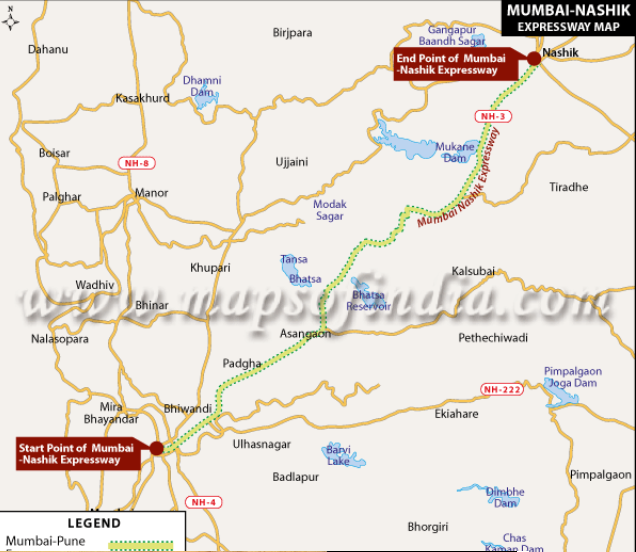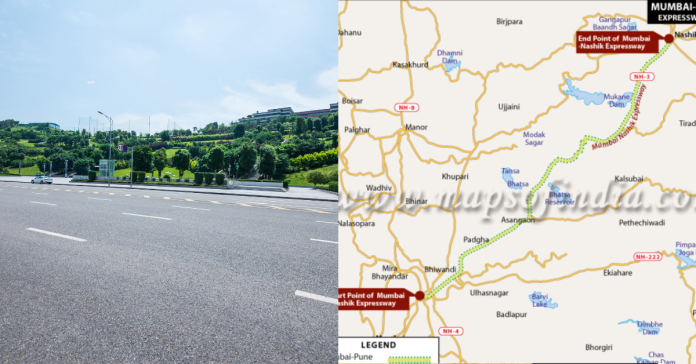The Mumbai Nashik Expressway, a 150-kilometer lifeline connecting Maharashtra’s financial capital to the “Wine Capital” of Nashik, is undergoing a significant transformation. Let’s delve into the latest updates, its impact on the region, and the real estate boom it’s fostering.
Mumbai Nashik Expressway KeyFacts
| Feature | Description |
|---|---|
| Starting Point | Mumbai, Maharashtra |
| Ending Point | Nashik, Maharashtra |
| Total Distance | 150 kilometers |
| Current Status | Four-lane expressway |
| Underway Project | Expansion to 12 lanes |
| Managed By | National Highway Authority of India (NHAI) |
| Year Opened | 2009 |
| Connected Towns | Mumbai, Thane, Kalyan, Shahapur, Igatpuri, Nashik |
| Key Benefits | Reduced travel time, improved connectivity, economic boost, real estate growth, tourism potential |
Latest News and Upgrades:
- Project Completion Push: Maharashtra Chief Minister Eknath Shinde recently directed the National Highway Authority of India (NHAI) to expedite the expressway’s expansion project. This ambitious plan aims to convert the existing highway into a massive 12-lane expressway with improved safety measures [Mid-day].
- Emphasis on Timely Completion: The directive underscores the importance of completing the project within the designated timeframe to minimize inconvenience to commuters and businesses. This focus on timely delivery is positive news for the region’s economic development.
Real Estate Boom Along the Corridor:
The improved connectivity promised by the expressway expansion is fueling a real estate boom in surrounding areas. Here’s how:
Improved Connectivity:
- Reduced Travel Time: The expressway expansion promises significantly faster commutes between Mumbai and Nashik. This translates to shorter travel times for both passenger vehicles and commercial trucks, boosting efficiency and productivity.
- Enhanced Accessibility: Better connectivity opens up new residential options for people working in Mumbai. Cities like Thane, Navi Mumbai, and Bhiwandi become more viable choices due to the quicker connection.
Economic Boost:
- Logistics & Trade: The increased capacity of the expressway will facilitate smoother movement of goods between Mumbai and Nashik. This benefits industries in both cities by reducing transportation costs and lead times.
- Industrial Corridor Potential: The improved infrastructure can attract new industries seeking efficient logistics. This creates job opportunities, stimulates economic growth along the corridor, and fuels demand for commercial and warehousing spaces.
Real Estate Boom:
- Increased Demand: The expressway’s positive impact on accessibility is expected to drive up demand for residential property in cities like Thane and Navi Mumbai. This presents lucrative investment opportunities for those with a long-term vision.
- Improved Quality of Life: Reduced commute times allow people to live further away from the hustle and bustle of Mumbai while maintaining a shorter commute. This can lead to a better work-life balance and improved overall quality of life.
Additional Advantages:
- Tourism Potential: Easier access to Nashik, known for its wineries and historical sites, can boost tourism in the region.
- Reduced Traffic Congestion: The expanded expressway can help alleviate traffic congestion on existing roads, especially during peak hours.
Mumbai Nasik Expressway Route Map

Source: MapsofIndia
A Look Back: The Expressway’s History
The story of the Mumbai-Nashik Expressway began as a segment of National Highway 3, a crucial north-south connector. Recognizing its potential, the National Highway Authority of India (NHAI) developed it as a dedicated expressway in 2009, significantly improving travel between the two cities.
Connected Towns and Route Map:
The expressway slices through the heart of Maharashtra, connecting these key towns:
- Mumbai: Maharashtra’s financial powerhouse and the starting point of the journey.
- Thane: A rapidly developing city offering a vibrant mix of residential and commercial spaces.
- Kalyan: A prominent industrial hub known for its textile and automobile industries.
- Shahapur: An emerging industrial and logistics center strategically located along the expressway.
- Igatpuri: Nestled amidst the Sahyadri mountains, offering a scenic escape for weary travelers.
- Nashik: The “Wine Capital” of India, famous for its pilgrimage sites and burgeoning industries.
Frequently Asked Questions:
The exact time is yet to be determined, but the project aims for a significant reduction in travel time compared to the current four-lane expressway.
There’s no official confirmation yet, but recent directives emphasize faster completion. Keep an eye out for updates from the NHAI.
Toll charges are subject to change, but announcements typically come from the NHAI. Look for official updates closer to the project’s completion.
Cities like Thane, Navi Mumbai, and Bhiwandi are likely to experience a rise in demand due to their proximity to Mumbai and improved accessibility.
Environmental impact during construction and managing traffic flow are key considerations. The NHAI will strive to minimize these challenge
Suggested Articles:
Pune Bangalore Expressway: Complete Guide & latest updates 2024
Yamuna Expressway -Taj Expressway: Route Map, and Guide 2024
Hyderabad-Raipur Expressway: Complete Project Guide 2024


